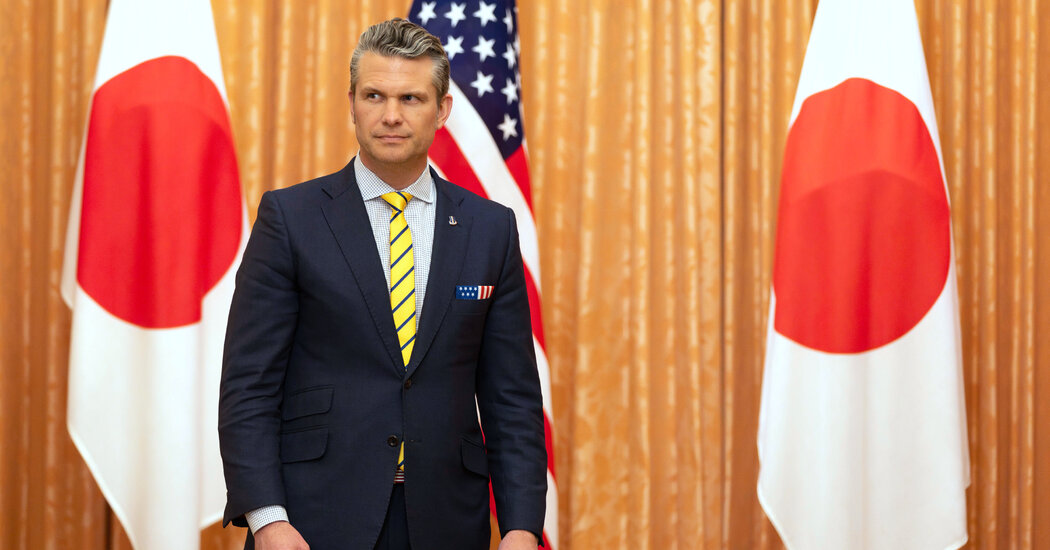Secretary of Defense Pete Hegseth wrapped up his first official visit to the Asia on Sunday by offering reassurances to Japan that President Trump wants a stronger military alliance in the region to deter an increasingly assertive China.
Following an 85-minute meeting in Tokyo with his Japanese counterpart, Mr. Hegseth said the Trump administration would abide by promises to increase security cooperation with its staunch ally. This would include speeding up a Biden administration-era plan to create a new joint U.S.-Japan military command in Tokyo that he called a “war-fighting headquarters,” although Mr. Hesgeth did not say when it would become operational. He also said there would be more joint military exercises in the Okinawa, islands near Taiwan, a self-ruled island that China says is part of its territory and has threatened to take by force.
Mr. Hegseth arrived in Japan from the Philippines, another U.S. ally, where the defense secretary also sought to allay anxiety about the Trump administration’s commitment to the region. Japan has watched with concern as the United States has broken with traditional allies in Europe to seek a deal that might allow Russia to keep territory seized from Ukraine.
Japanese officials have worried in private that such concessions might encourage China to make a move on Taiwan. After the meeting with Gen Nakatani, the Japanese defense minister, Mr. Hegseth struck a strident tone about the alliance, proclaiming that the United States would work with Japan to secure “peace through strength” that will deter the Chinese from taking action.
“America first does not mean America alone,” Mr. Hegseth told reporters. “America and Japan stand firmly together in the face of aggressive and coercive actions by the communist Chinese.” Mr. Hegseth did not address concerns about his sharing of military information on the Signal chat app that included a journalist.
Mr. Hegseth’s visit to Japan included a stop on the island of Iwo Jima, where American and Japanese forces fought one of the bloodiest battles of World War II. The U.S. defense secretary attended a ceremony to mark the 80th anniversary of the battle, where he briefly met Prime Minister Shigeru Ishiba of Japan.
The symbolism of the island visit was significant. It showed how two wartime foes had become close partners and came at a time that many Japanese feel the country is facing its most adverse security environment since 1945.
Mr. Nakatani said he explained to Mr. Hegseth how Japan is responding to the challenges with a plan, which predates the Trump administration, to double its defense and other security spending by 2027. He told reporters that the two did not discuss new targets for Japan to further increase spending or step up contributions to pay for the 50,000-strong U.S. military presence in the nation.
“I shared how Japan is, through our own part, making efforts to drastically strengthen our defense capabilities,” Mr. Nakatani said.
After the meeting, Japanese defense ministry officials, who spoke on condition of anonymity since they were not authorized to discuss these matters in public, said they were pleased with the talks. They said Mr. Hegseth had gone far in dispelling their concerns that President Trump might not honor commitments made by the previous administration.
They said their biggest worry had been the fate of the joint command, a more than $1 billion project that some U.S. media had reported would be axed as part of the Trump administration’s cost cutting. The new headquarters will allow the two nations’ militaries to work more closely together during a crisis in the region around Japan.
Mr. Hegseth called Japan “a model ally” that would work closely with the United States while building up its own military.
“We’re confident that Japan will make the correct determination of what capabilities are needed,” he said.
Analysts said the level of agreement reflected the extent to which Japan has shed its postwar pacifism in recent years, driven by the growing Chinese military presence in the region as well as the nuclear buildup by North Korea.
Mr. Ishiba, the Japanese prime minister, has long called for the country to become a more fully-fledged military partner of the United States.
“Trump wants Japan to do more, and Ishiba wants Japan to do more,” said Masato Kamikubo, a professor of international policy studies at Ritsumeikan University. “There’s a meeting of the minds between these two.”
